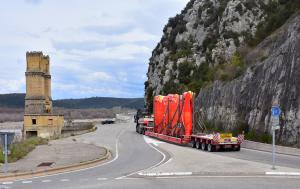A narrow passage to ITER
3 Apr 2017
At the gorge of Mirabeau, 10 kilometres to the south of the ITER site, the wide Durance riverbed abruptly narrows into a gully less than 180 metres wide.
The remnants of the old bridge of Mirabeau, built in 1847, seem to stand guard over the narrow passage that leads to ITER.
Overlooking the left bank, a road leading to the village of Saint-Paul-lez-Durance was hewn from the rock. Despite recent adjustments, it still offers only limited space for passage.
And yet, this is the road every ITER convoy must travel in order to reach the ITER site.
In this picture, a segment of the ITER cryostat lower cylinder is embarking on the last leg of its journey—ITER is now only 30 minutes away.
To the left, the remnants of the old bridge, built in 1847, seem to stand guard over the passage.
Initially planned as an HEL convoy (for Highly Exceptional Load)—a massive and costly logistics operation—the six lower cylinder segments of the cryostat were all "downgraded" to CEL convoys (for Conventional Exceptional Load), a transport category that requires lighter technical assistance and a reduced security escort.
This was possible (with heavy technical adaptations) because the rather light components (39 tonnes) exceeded the typical CEL dimensions by only 65 centimetres in height.
We will soon have a story on how DAHER, the logistics service provider responsible for the transport of components from Fos-sur-Mer harbour to the ITER site, plans to bring down the anticipated number of HEL, in order to achieve "best value for money" while reducing the inconveniences of the ITER HEL convoys on local populations.


